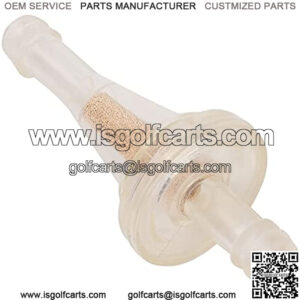Your fuel filter is exactly what it sounds like. It’s a filter that sits on your fuel line that prevents things like dirt and rust from getting into your engine.
If these contaminates do get into your engine, they can cause all kinds of issues. They can rapidly wear your fuel pump and fuel injectors, and severely diminish your car’s performance due to fuel not being burned correctly.
Your fuel filter needs to be replaced regularly. If you have an older car, you’ll probably need to replace it every 40,000 miles or so.
This doesn’t take into consideration the conditions you’re driving in. For example, if you live in a dusty area, you’ll need to replace your fuel filter more often on account of all the dust.
Today’s newer cars typically include the fuel filter as part of the fuel pump assembly – and you’ll need to replace it every 5 years or around 30-50k miles.
I recommend you check your owner’s manual for the specific service interval, as it does vary between makes.
This is especially important if you have a diesel-powered vehicle – as there’s fungus that can grow in diesel and then clog your filter, resulting in your fuel pump assembly blowing out.
That’s not what you want. The bill is certainly not pretty, coming in at somewhere between $400-$700.
So it pays to pay attention. Here are some signs that you may need to change your fuel filter.
SO, HOW DO YOU KNOW IF YOUR FUEL FILTER IS BAD?
1: Difficulty Starting Your Car
If you had no idea your car even had a fuel filter until now, and you’re reasonably sure that you’ve never had it changed, then pay attention to how your car is starting. One of the first signs of a bad fuel filter is difficulty starting your car. A clogged fuel filter restricts the flow of fuel to your engine which can make your engine run lean because of lack of fuel.
2: Car Jerks When Going Uphill
When your fuel filter is clogged, gasoline won’t flow through the filter as efficiently which can cause your car to jerk when additional fuel is needed, such as well you’re driving uphill. A clogged fuel filter will make your fuel pump work harder under load, which can also lead to fuel pump damage. We’ll get to that in just a minute.
3: Burning More Fuel Than Usual
If your Toyota Corolla’s fuel consumption is starting to feel uncomfortably like a Hummer, then you may want to take a look at your fuel filter.
When your fuel filter is clogged, your engine can run lean, which will result in it wasting fuel as it works harder to keep your car moving. Changing your fuel filter can lessen the load and increase the mileage you’re getting.
4: Reduced Engine Power
If you notice a loss of power when your engine is under increased load, such as when you’re driving fast, your fuel filter may be to blame.
When your fuel filter is clogged, your engine’s demand for fuel can’t be adequately met by the supply coming from the tank because the fuel filter is clogged.
5: Engine Stalls While Idling
If your dirty fuel filter goes unaddressed for too long, it can cause your engine to stall. This could occur when the engine is placed under additional stress, such as when going uphill or when accelerating.
However, if you’ve ignored the clogged fuel filter, your engine could stall right after starting because of inadequate fuel making it to the engine.
6: Fuel Pump Failure
As I mentioned earlier, a bad fuel filter causes your fuel pump to work harder than it should.
And at the end of the day, I’ve got no problem with working hard.
However, if your fuel pump works too hard, it might decide that it needs a permanent vacation.
If your fuel pump decides to blow up, changing your fuel filter isn’t going to fix the problem. But hey, sometimes it’s good to know. Besides sending your fuel pump to the Bahamas, a clogged fuel filter can have other consequences.

